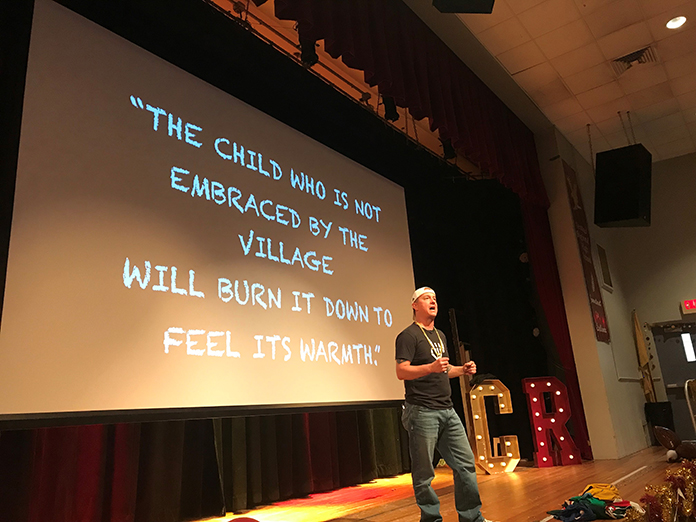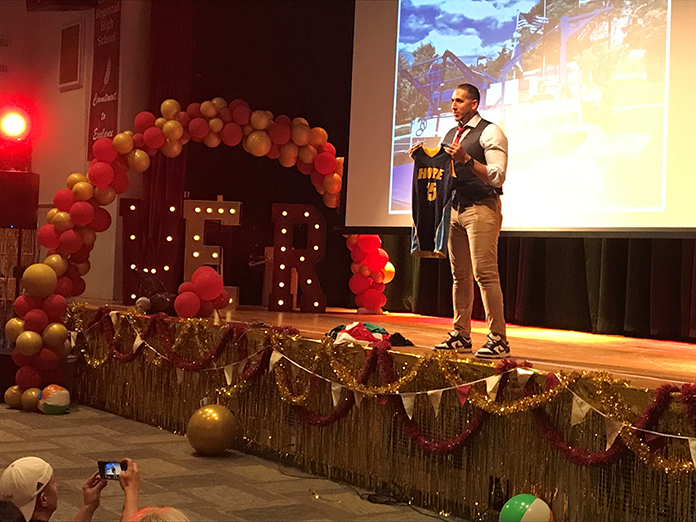
BERKELEY – School districts are going through a Renaissance in lifting up all students – even those wallflowers who don’t stand out from the crowd.
More than 30 schools throughout New Jersey and even Pennsylvania took part in Jostens Renaissance, hosted at Central Regional High School. This is a day of listening to uplifting speeches as well as sharing techniques for how to make all students and staff move in the right direction.
Superintendent Dr. Michelle CarneyRay-Yoder is the Renaissance “Champion” for the North-Atlantic Region which includes New Jersey. She said she wanted to host other districts to show “how wonderful our school is.” The fact that it happened to fall on the same day as the art show helped.
The framework of Jostens Renaissance is “Identify the values that you RESPECT and then RECOGNIZE and REWARD actions you want to see. REINFORCE your values through traditions and words, while looking for ways to create strong RELATIONSHIPS. All of this drives RESULTS.”
Besides the staff members, there were students from a variety of grades. They gathered in the theater to hear the keynote speaker, Gian-Paul Gonzalez, 9th grade history teacher in Union and the chaplain for the New York Giants.
He spoke about playing basketball with juveniles going through the justice system, and how these children think no one cares about them. He drew a comparison to the lonely kids in every school district.
“We go all in for the one who sits alone and walks alone to show we care,” he told the crowd.
After his speech, but before he met with a line of students wanting to meet him and ask him questions, he took a few minutes with The Berkeley Times. He explained that going “all in” for your friends is easier than being there for someone you don’t know as well.
In every school, he said that everyone knows the top 10% academically. They are in every program. They are constantly given accolades. And everyone knows the bottom 10%. The kids who are always in trouble. The ones whose names you hear being called to the principal’s office.
It’s the 80% in the middle that can fade into the background. These are kids who might be thinking “Does anyone care if I even go to school today? Does anyone see me? Does anyone know me? Does anyone love me?”

His message to the staff – and to the students – was that they should make sure that everyone feels included and part of the school community. They should spare some time and heart to reach out to someone who might be facing challenges.
A lot of times, someone might see a red flag and distance themselves because they are not close friends with the person in trouble. “We disqualify ourselves,” he said. “We don’t need to be an expert, just someone who cares.
“It has to be intentional. You have to choose to say ‘hi’ even if they don’t say ‘hi’ back,” he said. “But they’ll remember you said ‘hi.’”
Another speaker, Dr. Phil Campbell, was principal at Portland High School in Portland, TN who said he watched his school’s graduation, attendance, and discipline rates completely change once Renaissance thinking was implemented.
He wanted to share ideas for ways to make people feel valued and connected. This idea exchange lets teachers and administrators in other districts show you what could work for your own.
“We provide ideas and resources to create a positive school culture,” he said.
“These kids feel invisible,” he said. “What can we do as leaders to make them feel that they know they are part of the school community?”






